Zimbabwe
Zimbabwe, Africa's largest tobacco producer, began its annual tobacco-selling season on Wednesday, with officials and farmers projecting a sharp decline in harvests and quality because of a drought blamed on climate change and worsened by the El Niño weather phenomenon.
From a record harvest of 296 million kilograms (326,000 tons) last year, the country is estimating that production will fall to about 235 million kilograms (259,000 tons) this season, said Patrick Devenish, chairman of the Tobacco Industry Marketing Board, at the official opening event in the capital, Harare.
"Most of our tobacco is grown by small-scale farmers. They depend on the rains, and a drought is not good for their crop," Devenish said. "The quality of some of the tobacco may also be affected."
He said Zimbabwe sells the bulk of its tobacco to China, although Western and Eastern Europe and parts of Africa remain important markets. In 2023, it received a record $1.2 billion from tobacco exports, up from $975 million in 2022, according to the TIMB. Tobacco is one of the country's major foreign currency earners, along with minerals such as gold.
Agriculture minister Anxious Masuka said small-scale farmers, who lack equipment and depend on rain, produce about 75% of the crop. This makes the country's production vulnerable to weather conditions.
Like some of its southern African neighbors, Zimbabwe is battling a devastating drought that aid agencies blame on El Niño and climate change.
Tobacco production had been rebounding in the tiny African nation, after plummeting from about 240 million kilograms (265,000 tons) in 1998 to less than 50 million kilograms (60,000 tons) a decade later following the eviction of several thousand white farmers who accounted for the majority of growers.
With last year's record harvest, Zimbabwe regained its spot as one of the world's top 10 exporters of tobacco, alongside mega producer China, India, Brazil, the United States and Indonesia.
China has been central to Zimbabwe's tobacco boom by establishing a grower contract system run by the state-owned China National Tobacco Corp., the world's largest cigarette producer. Under the system, the Chinese company provides seeds, fertilizers, food, and money to pay for labor and wood for curing the tobacco to Black farmers, who now make up the majority of Zimbabwe's tobacco producers. The farmers, in exchange, are obligated to sell their crop to the Chinese company or its agents.
About 95% of Zimbabwe's crop is financed through the contract system, which is now also offered by some non-Chinese local and foreign companies. Farmers, many of whom are unable to get loans from banks due to a lack of collateral, say this financing system leaves them in a cycle of debt.
The country had hoped to increase its harvest to 300 million kilograms (330,000 tons) by the end of 2025 under a government-led tobacco transformation plan adopted in 2021.
But the drought has badly dented farmers' optimism this season.
"The drought is likely to cost farmers 20% or more of their usual earnings," said George Seremwe, president of the Zimbabwe Tobacco Growers Association, which represents Black small-scale farmers.
Likephone Makii, a tobacco farmer from Madziwa, about 140 kilometers (90 miles) northwest of Harare, looked at the price he received at auction for one of his bales, just $1.70 a kilogram because of its poor quality, and shook his head in dejection.
Makii, who has been growing tobacco for the last nine years, said he usually harvests 6,000-7,000 kilograms (6.6-7.7 tons) from his two-hectare (5-acre) plot, which relies on rainwater. He expects only 3,000 kilograms (3.3 tons) this season.
"It has been the toughest season for me and my fellow small-scale farmers," he said.
Reliant solely on tobacco for survival, Makii predicted his family would need food assistance to make it through the year.
He will join millions of others forced to rely on food aid as the drought takes its toll on families that grow cash crops such as tobacco as well as staple foods such as maize, according to aid agencies.



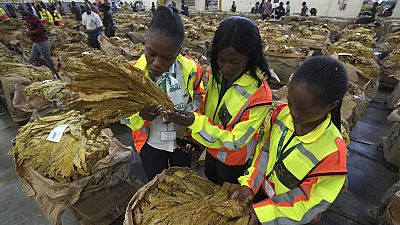

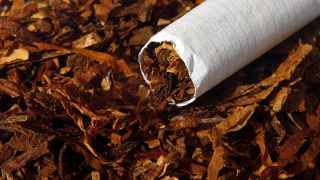
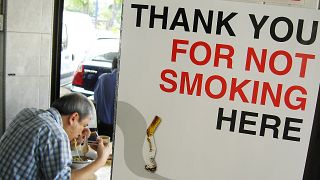
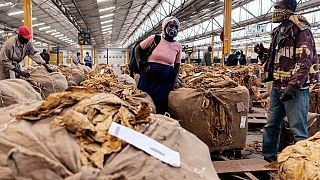
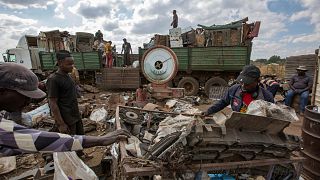





Go to video
Ruto's $9M mega church sparks outrage amid Kenya's crisis
Go to video
“I can’t do nuttin’ for ya man”, Nigerian Minister quotes Flavour Flav in rejection of Trump policy
Go to video
U.S. slashes visa duration for some African nationals amid policy shift
Go to video
Nigeria snubbed at White House summit, opposition blames Tinubu
Go to video
Ghana cracks down on gold smuggling with new multi-agency task force
Go to video
African migrants targeted as visa scams surge amid tougher immigration rules in Canada